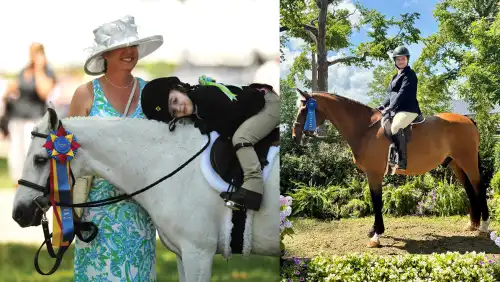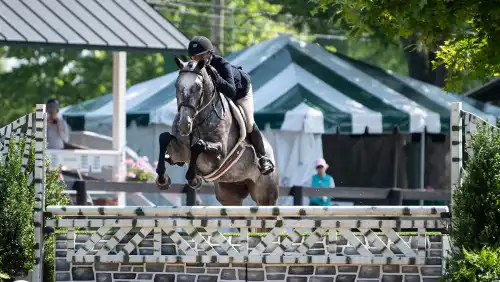When Phyllis Kimber retired her longtime equine partner to pasture nearly four years ago, she knew she couldn’t afford to purchase a new mount while still financially supporting him. Instead, she began leasing a “sweet, sweet” older horse named “Showdown,” owned by her trainer, Stephen Pellett of Meadow Hill Farm in Pebble Beach, California.
Now, Kimber is one half of a dynamic duo of septuagenarians who partner with the former rescue horse—exact age is unknown but estimated to be at least 20—for showing and lessons.
“Showdown is just a wonderful horse,” Kimber said. “It’s always a challenge to know how a horse will wear on my body. He has no hiccups; he’ll take me to the jump, he doesn’t over jump, and if you mess him up, he’s forgotten about it when you circle him around.”
For nearly a decade, Showdown’s main job has been teaching novice riders in the Meadow Hill lesson program. But in 2022, Kimber took the chestnut gelding to a few shows at the Paso Robles Horse Park in Paso Robles, California, where they competed in the long stirrup hunter and equitation divisions. At their most recent competition, the USEF-recognized Paso Park Fall Classic in November, the pair were crowned long stirrup reserve champions.
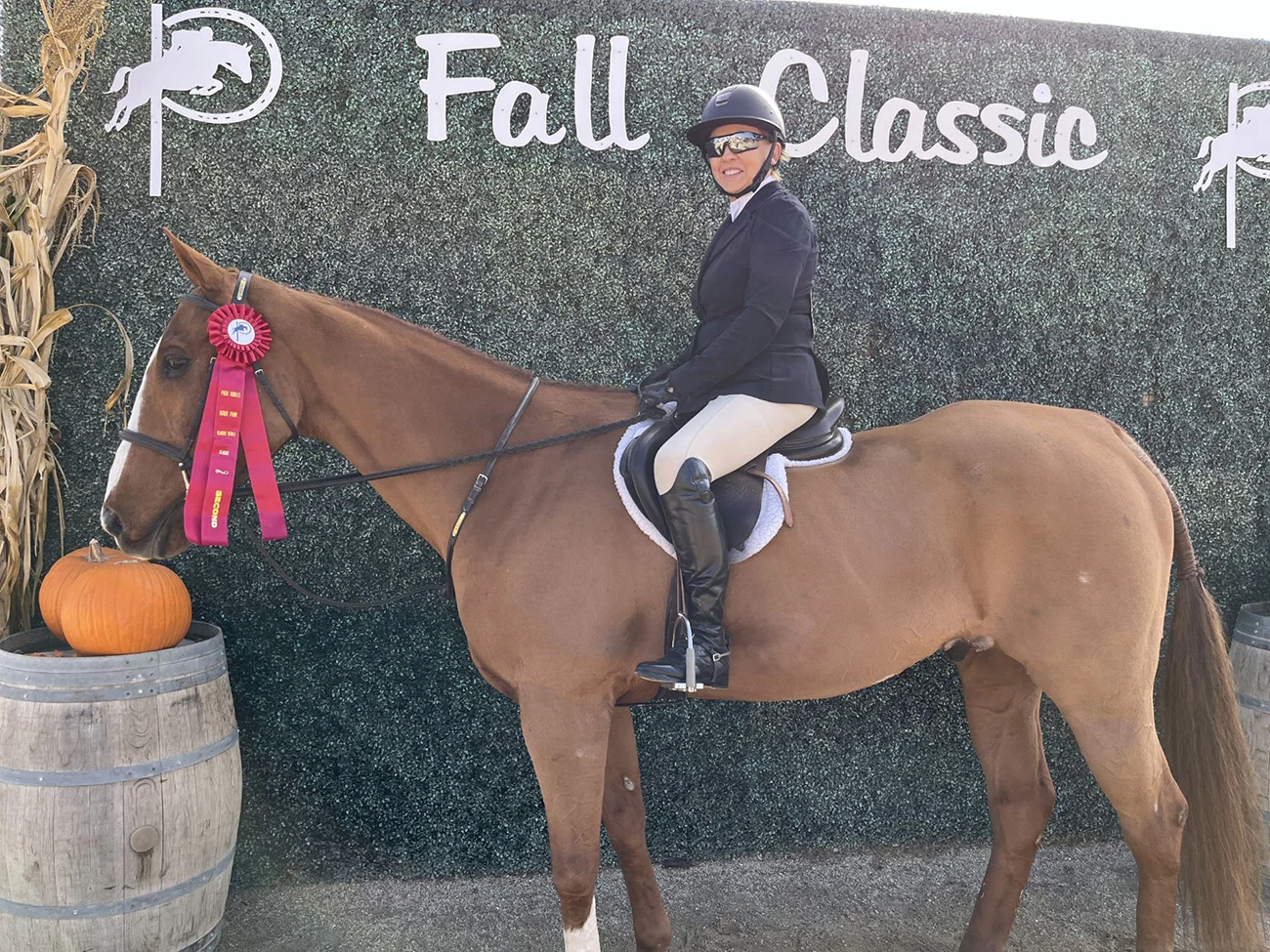
“He hadn’t shown in a couple of years,” said Kimber, of Del Rey Oaks, California. “I’m the first one to dust him off and take him back out. I used to do jumpers, but now I’m just happy if I can get in the ring and remember the course and go all the way around.
“To get a ribbon on top of that, that’s just, ‘Wow,’ ” she continued. “I’m not that aggressive of a rider, so being on Showdown, he’s perfect. Winning the reserve championship was very rewarding and a real accomplishment.”
Unlike Kimber, Showdown’s other rider Gail Krempasky doesn’t like to compete—but three times a week, she loves riding Showdown, whom she describes as “a real people pleaser.”
“He is incredibly accommodating, and he anticipates a lot, which is kind of fun,” said Krempasky, of Salinas, California. “He is very patient. I’ve owned three horses in my life that all had the personality of ‘love me to death, and I’ll do whatever you ask of me.’ Showdown is the fourth horse I’ve known that is like that.”
It seems clear that today, Showdown has acquired a devoted fan club. But there was a time when the Appendix Quarter Horse-type gelding’s future was less assured. In fact, as a younger horse, Showdown ended up at the SPCA of Monterey County in Salinas, California, although the details of exactly how and why are lost to time. What is known is that Showdown was adopted by a man who hoped to make him a cow horse and to go trail riding; however, the gelding quickly shared his antipathy for such activities.
“He would rear, spin on the trails, take off; he just was not wanting to do it,” said Pellett, 33. “I started working with Showdown a little over 10 years ago, when I was just starting my business. At the time, one of my clients was half-leasing him [from the adopter], just so she had something to ride.”
Pellett quickly realized that Showdown’s behavior changed in English tack. The gelding was noticeably more mellow, easy going, and didn’t react negatively to his environment when wearing a jump saddle. One day, Pellett put down some ground poles, then built a few small fences, just to see what Showdown would do. When the horse acted like he understood the job, Pellett’s interest was piqued.
“I realized maybe he could do more than just walk, trot, canter around,” he said. “I feel like he must have had some sort of training, I just don’t know how much. But he is a smart horse; maybe he just figured it out.”
ADVERTISEMENT
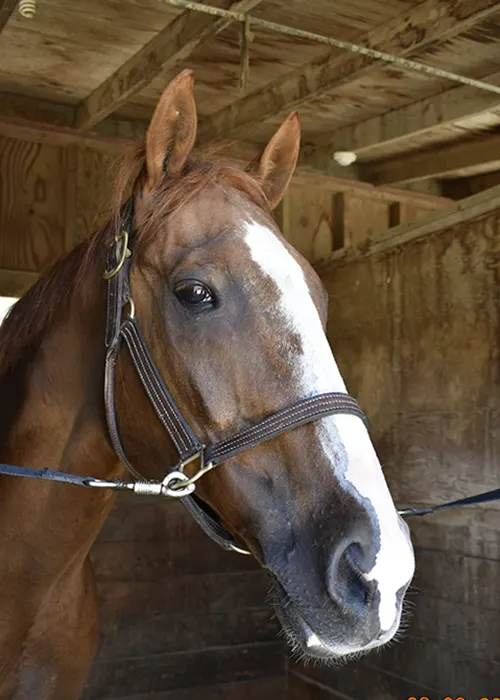
Although willing, at first Showdown was far from a superstar over fences. He was stiff laterally, and although fences taken off the left lead went smoothly, when approached off the right, Showdown could be unpredictable.
“In the moment, he was the worst lesson horse ever,” Pellett recalled with a laugh. “Any time we’d try to canter to the right and jump a jump, he would stick his head straight in the air, open his mouth, and take off. He was controllable—no one ever fell off of him or anything like that—but it was almost like he had a moment of panic.”
Despite this behavior, Showdown’s good qualities made him fun enough that the student half-leasing him stuck with him. Pellett eventually assumed the other half of Showdown’s lease and incorporated the gelding into his growing lesson program, where he proved just the right amount of challenge for more advanced juniors and amateurs alike.
Using these students to educate the horse, Pellett calmly worked through basic exercises until Showdown’s seeming panic about fences off the right lead eventually subsided. He even learned how to do flying changes, although one change remains stickier than the other.
“We really didn’t do anything special,” he said. “Just some kindness and consistency seemed to make him realize he was OK. As the years went on, he just got better and better.”
About six years ago, after seeing Showdown blossom in the Meadow Hill Farm program, his adopter arranged with the SPCA to formally transfer ownership of the horse to Pellett. As Showdown’s confidence in his job increased, so did his importance in Pellett’s lesson program.
“Although at first I used him for more advanced riders, as time has gone on, he’s just become a super safe, easygoing horse for anybody to ride,” Pellett said. “He’s been to a handful of shows in the 10 years or so we’ve had him, and he’s done some jumpers, some hunters and some equitation. I came up with the name Show And Tell when we took him to his first horse show, five or six years ago.”
But perhaps where Showdown has really found his niche is in giving novice riders—and women “of a certain age,” as Kimber and Krempasky jokingly call themselves—the confidence to keep practicing the sport they love.
“He is a very forgiving horse,” Kimber said. “He’ll take care of you, and that matters a lot, especially when you’re older. I wouldn’t be showing him if I didn’t trust him.”
“He’s very calm, very quiet,” Krempasky added. “The way I look at this is, we are both old and aging together. Hopefully, we’ll age together until both of us can’t do this anymore.”
When Pellett first met Showdown, the gelding was a bit standoffish and shut down, but he said that changed as he became more comfortable in his work.
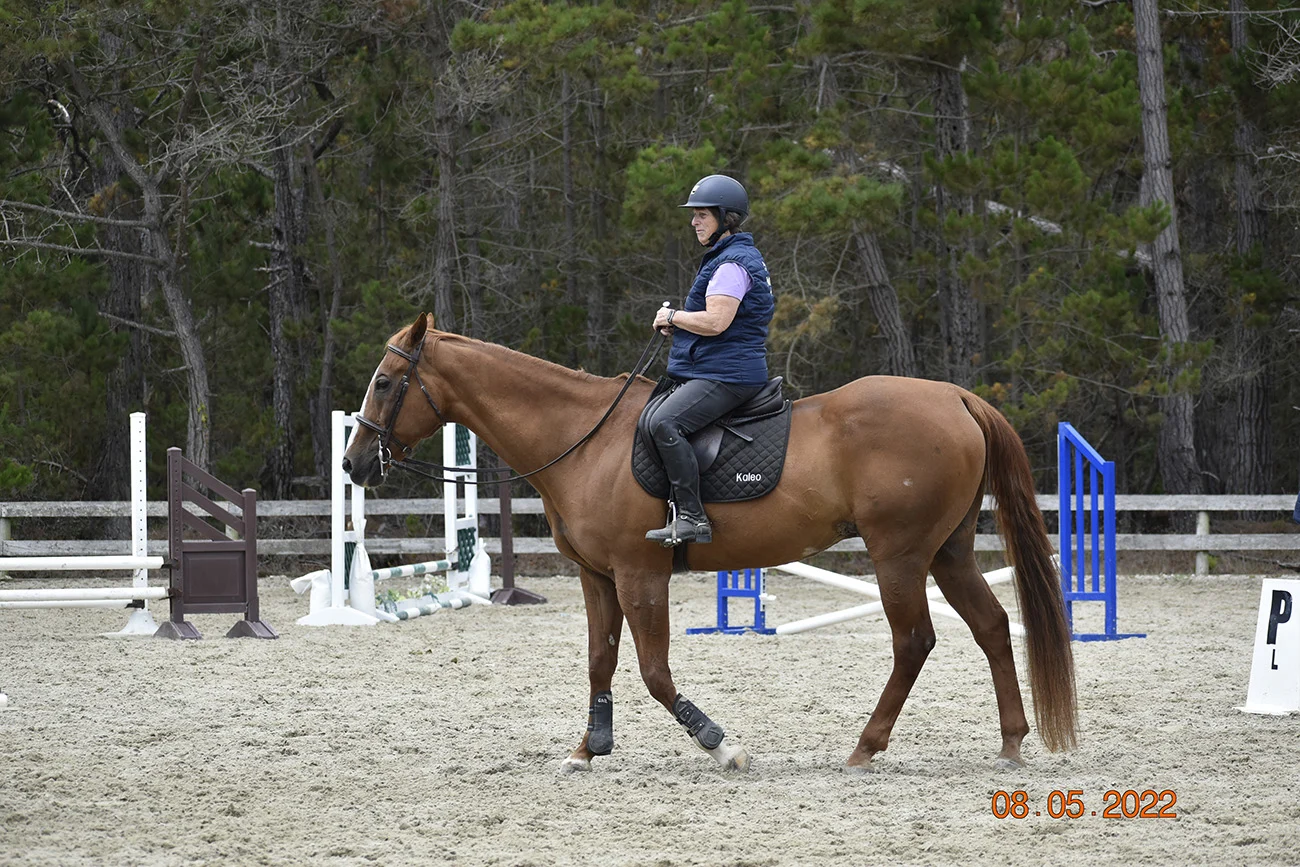
“He would still do his job, but he was like, ‘Let me work, then leave me alone,’ ” Pellett said. “He wasn’t the most personable horse; he didn’t like to be cuddled, he won’t eat apples, he’ll barely eat carrots or cookies. As the years have gone on, I’ve learned more about him, and he’s trusted me more. Now, he calls out to you, and you can call his name, and he perks up and looks at you.”
Kimber confesses that she gives Showdown a treat every time she passes his stall—he prefers the German Horse Muffin Treats made by Equus Magnificus—as well as when he meets her at the gate.
ADVERTISEMENT
“I’ll tell him, ‘OK, I’ll give you a muffin, but then I get to ride you,’ ” Kimber said with a laugh. “I spoil him, but he deserves it.”
Given that Showdown’s age is unknown—veterinarians estimate he is at least 20, quite possibly older—schooling and showing over fences 2’ and below is the perfect formula for keeping him sound and healthy. Pellett appreciates that these days, his riding time is mostly split between Kimber and Krempasky, who each dote on the gelding and have no aspirations of jumping any higher at this stage of their riding careers. When the time comes for Showdown to fully retire, Pellett has already made arrangements for him to become an unmounted therapy horse in his friend’s program.
In the years since he first met Showdown, Pellett’s business has grown; he is now based at the Pebble Beach Equestrian Center in Pebble Beach, California, rides in grand prix classes, and has riders ranging from beginners to advanced in all three rings. But he still appreciates the important lessons Showdown has taught both him and his students.
“He’s been part of my career from the very beginning,” Pellett said. “He’s been such a good horse for me, and the fact I essentially got to make him into this wonderful lesson horse that people can enjoy makes me feel really proud.”
Working with Showdown has also reinforced for Pellett that when horses act in a disobedient manner, they are usually trying to tell you something—a lesson he has applied time and again when working with animals whose challenging behavior sometimes caused others to move on.
“I don’t give up on those horses,” Pellett said. “I think they all have a purpose, and they all want to do their jobs. I don’t think those horses are mean horses, when they decide not to do things. It’s just their circumstances, or maybe they are misunderstood. Here, they settle into the program, and they succeed, and I know what it takes to keep them successful. They have a long career here.
“So many people just want to find the quick, easy fix,” he continued. “That’s why I think people look away from these horses. That’s a big problem with our sport right now.”
Krempasky thinks that Showdown’s story emphasizes some of the most important precepts of her own personal horsemanship philosophy.
“All horses have a purpose, and it’s up to the person who owns them to recognize their purpose,” she said. “If what you are doing with them is not their purpose, it is up to their owner to find the right purpose, or else they’re not doing the best for the horse.”
Do you know a horse or pony who has been rescued from a dangerous situation to become a healthy, trusted competition partner today? If you think you have a good candidate for “From Rescue To Ribbons,” let us know by emailing mwright@coth.com.









